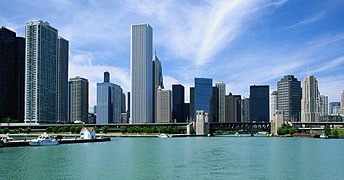What Can I Do to Conserve and Manage Water?

Chicago was built in this very location because of its access to water. Lake Michigan and the other Great Lakes hold 20% of the Earth's fresh water and 80% of all the fresh water in North America. One might ask, with so much water nearby why worry about wasting it? Only 1% of Lake Michigan is naturally replenished each year. This means that some of the water we are using today has been in the lake for 100 years. The amount of water we can take from Lake Michigan is governed by Federal Law, an International Agreement with Canada, and US Supreme Court cases. As caretakers of this precious resource, it is our duty to care for it responsibly and ensure that it remains a healthy resource for future generations.
What YOU can do?
Conserve
- Run the dishwasher and washing machine only when there is a full load or use low water level features. Water your lawn in the early morning, when temperatures are cooler, to minimize evaporation. Repair dripping faucets and leaky toilets.
- Don’t dump.
- Take your motor oil or household chemicals to city-sponsored household hazardous waste drop-off events for disposal. Don't dump it down the drain or in the sewer.
Manage Stormwater
- Disconnect your downspouts when appropriate. Water runoff during heavy storms can overload Chicago's sewer system, thus dumping sewage into the river.
- Use the rainwater from your roof by letting it run into your garden.
Water Facts
- Turning the water off while brushing your teeth, shaving, or washing your face could save between 10 and 20 gallons of water per person per week.
- The bathroom accounts for 75 percent of the water used inside the home.
- A typical toilet uses up to five gallons per flush.
- A faucet dripping at the rate of one drop per second wastes 2,700 gallons per year.
- A leaky toilet wastes more than 50 gallons of water per day.
- Each gallon of gasoline used requires 1,000 gallons of water to produce.
- Each glass of restaurant water requires two glasses of water for washing and rinsing.
- The used oil from one oil change (approximately 4 quarts of oil), dumped down a storm drain, can contaminate 1 million gallons of water.
